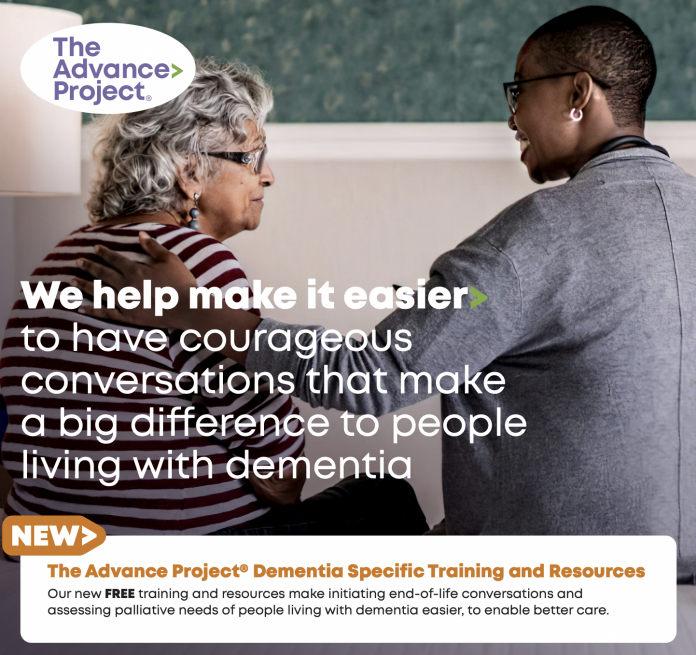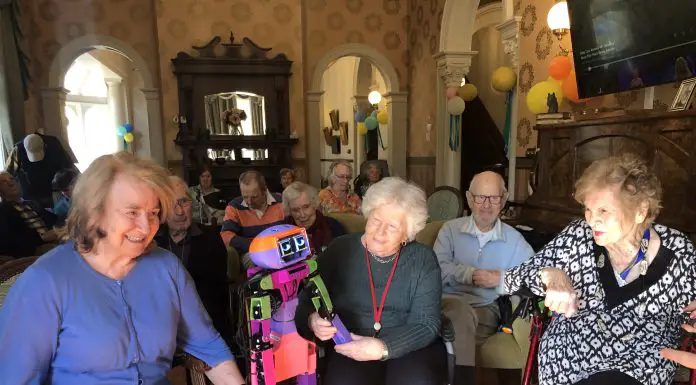A new set of practical resources for frontline aged care staff has been developed to help them initiate courageous end-of-life conversations about advance care planning with people living with different stages of dementia.
The Advance Project online toolkit is a free, practical, evidence-based suite of resources including team-based training to empower frontline staff to initiate advance care planning and effective screening for palliative care needs for people living with dementia in aged care homes and community settings.
Recent figures show only about 6 per cent of residents in aged care homes access palliative care despite the increasingly complex needs of these residents[1]. While a person with dementia may live with symptoms for many years, dementia is a terminal illness.
The Advance Project toolkit, funded by the Australian Government under the National Palliative Care Projects scheme, includes training videos and eLearning with real-life scenarios to take staff through approaches and tips to help them initiate conversations about advance care planning and palliative care with a person living with dementia and their family. Download this free resource…
HammondCare General Manager Health and Palliative Care Andrew Montague said the resources support a relationship-based approach to care that requires getting to know the individual and their needs and preferences at an important stage in their life.
“Sadly, it is often that case that people living with dementia haven’t had the same opportunities as everyone else to express their needs and wishes for care at the end-of-life,” Dr Montague said
“These valuable resources, specifically designed to support our residential and community aged care professionals, can help deliver palliative care to those most in need at a critical time.”
The resources were produced by a team of HammondCare clinicians and researchers led by Professor Josephine Clayton and Jon San Martin with input and feedback from a national expert advisory group, people living with dementia and their families, GPs, nurses, allied health professionals, care workers, as well as aged and primary care managers.
Lynne Sewell, whose husband Rick Sewell was diagnosed with Primary Progressive Aphasia and Fronto Temporal Dementia in 2014, said there was a need for honest conversations after a dementia diagnosis, even though the conversations are “confronting”.
“When someone is diagnosed with dementia, they get handed brochures and other material, but it doesn’t sink in that this is ultimately a fatal disease,” Ms Sewell said. “We were told to go and enjoy the rest of our life, no discussion about planning for the future or getting things in order.’’
“It’s really important to know in advance whether a person living with dementia would like to be resuscitated no matter what, whether they would like to die at home, for instance, or even their wishes for celebrating their life with a funeral or something else or to be cremated or buried,” she said.
This new dementia-specific toolkit for aged care staff follows successful Advance Project resources developed to support Australian GPs and nurses working in general practice settings.
Professor Clayton said a better understanding of the needs of aged care residents and clients with dementia would help relieve needless suffering.
“It’s important to have ongoing conversations about the person’s end-of-life wishes initiated by staff members who already know the person with dementia and their family, and in a way that is respectful, supportive, and centred to the care of the person.”, said Professor Clayton.
“The ultimate goal is to enable people living with dementia to have the opportunity to express their needs and preferences for care at the end of life, and have better access to palliative care when required, and support for their families and carers,” Professor Clayton said.
[1] Australian Institute of Health and Welfare, Palliative care services in Australia, Table AC.4 Separations of permanent residential aged care residents, by palliative care status, mode of separation, 2019-20, Canberra 2021.










